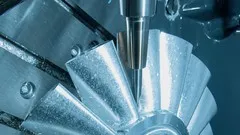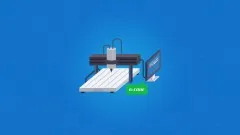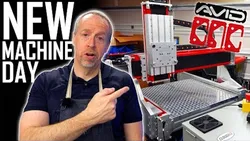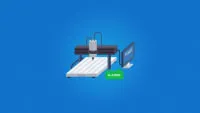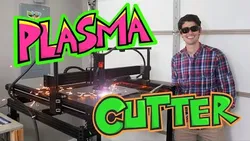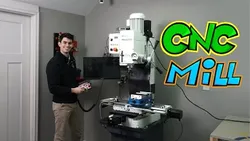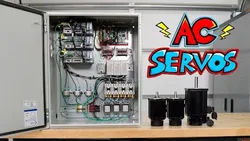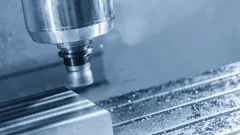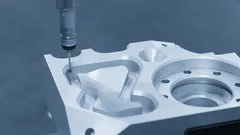Free Online CNC Courses and Certifications 2024
CNC (Computer Numerical Control) is a form of engineering that uses computers to control machine tools. It is a powerful tool for creating precision parts and components, and is used in a wide range of industries. With the help of online courses, learners can gain knowledge and skills in CNC, allowing them to create complex parts and components with accuracy and efficiency. CNC is an essential part of modern engineering, and is a great way to learn the fundamentals of engineering.
Popular Courses
This course is perfect for CNC machinists looking to increase their hourly rate and climb the ladder. Learn CNC machine ISO programming, FANUC Macro B parametric GCode programming, and SwanSoft CNC simulation software. Understand the G Code language, optimize cutting time and price, write custom canned cycles, and use equations and maths within your program. With this course, you can become the best in the business and earn more money. Take the first step to becoming a CNC programming expert today!
Learn MoreThis course is perfect for anyone interested in learning how to program CNC machines. It will teach you the basics of G-Code and how to apply it to real parts. You will be given materials to help you understand the fundamentals and watch tutorials of G-Code in action. The course also includes CNC simulators so you can see the results of your code. With this course, you will have the necessary materials to turn drawings into physical parts. Whether you are a machinist or a DIY enthusiast, this course is perfect for you.
Learn MoreThis course provides an overview of Acorn and Ether1616 Controllers, Clearpath Interface, Layout and Wire Routing, Power Domains, Flyback Diodes and Snubbers, Control PC, Wireless MPG Pendant, Connecting Everything, Servo Brake, Bench Test: Motors and Brake, I/O Configuration, Bench Test: Pneumatics and Dust Collection, and Bench Test: Servo Fault. Learn how to set up and test Acorn and Clearpath CNC Control Boxes with this comprehensive online course.
Learn MoreThis course provides an introduction to the Avid Benchtop Pro CNC with ClearPath and Centroid Acorn. It covers assembly, motor screw mismatch, making studs, mounting motors, wiring it all together, issues encountered, first movement, software configuration, rapid tests, and wrap and next steps. It is an online learning course that provides skill training for using a CNC machine.
Learn MoreThis course covers the design and assembly of a safer M12 breakout board using Avid CNC. It covers topics such as normally-open vs normally-closed, circuit design, PCB assembly, testing, fixing glitches, SMT sample books, modified board, re-testing, better solutions, board surgery, re-re-testing, and conclusions. Students will gain a better understanding of the design and assembly process.
Learn MoreThis course provides a comprehensive introduction to CNC programming with G-Code for beginners. It covers the fundamentals of G-Code and provides the skills needed to create machined parts. It is an ideal starting point for those looking to enter the world of CNC machining.
Learn MoreThis course provides an overview of how to build a CNC Plasma Cutter. It covers the parts and overview, mechanical assembly, floating head, stand assembly, electrical wiring, blackbox motion controller, firmware and control software, water table, and high frequency noise. It is a comprehensive guide to building a CNC Plasma Cutter, from start to finish.
Learn MoreThis course provides an overview of the process of converting a manual mill to CNC. It covers topics such as lead screw vs. ball screw, disassembly, dovetail ways, Z-axis conversion, hand-scraped ways, Y-axis conversion, X-axis conversion, reassembly, tramming, electronics, and LinuxCNC. After completing the course, users will have the knowledge to successfully convert a manual mill to CNC.
Learn MoreThis course covers the installation and tuning of AC servo motors and FogBuster Mist Coolant for DIY CNC Mill Upgrades. It includes topics such as servo vs stepper motors, MQL systems, compressed air setup, relay & flyback diode, atomizing, and test cut. Participants will learn how to install servo motors and FogBuster, as well as how to achieve faster rapids.
Learn MoreThis course covers the upgrades to a DIY CNC Mill, focusing on Rigid Tapping with a new motor and VFD. It introduces tapping and threads, tension compression tapping, thread milling, and the use of a general duty motor and Marathon Inverter Motor. It also covers motor mounting plates, taper lock pulleys, and the decision to DIY or buy a CNC Mill, as well as belting. This course provides all the necessary information to upgrade a DIY CNC Mill.
Learn MoreThis course is perfect for CNC Router owners, machinists, and DIY enthusiasts who want to learn the basics of CNC programming. It covers the fundamentals of GCode, the language of CNC machines, and provides step-by-step instructions for programming parts. The course also covers MCODES Cycles, the Cartesian coordinate system, tooling, cutter compensation, and more. With 5 full CNC programs, you'll learn tips and tricks used by professional CNC machinists to get the results they need. After completing this course, you'll be able to program any shape using GCODE.
Learn MoreThis course is perfect for CNC machinists, hobbyists and professionals who want to learn how to use Fusion 360 to produce parts for their CNC machine. Written by a machinist for machinists, this course starts by getting you familiar with the parts of Fusion that are needed to produce a component on a CNC machine. It then covers 3D milling roughing cycles, finishing passes, engraving, and how to adjust CAM tool paths to produce excellent results. With Fusion 360 being free for hobbyists, startups and makers, this course is the perfect way to learn how to use this powerful CAD/CAM system.
Learn MoreThis course is perfect for anyone looking to become a CNC machinist or improve their skills in the field. Learn to program CNC milling machines using FANUC G-Code, the language of CNC machines. Understand all cycles and techniques, such as G81 drilling cycle, G82 counter boring, G83 peck drilling, G84 tapping cycle, G85 boring cycles, G10 and G54 datum setup, helical milling, programming best practices, example programs, G17, G18 and G19 planes explained, and floating datum. Become an expert in the world of CNC machining with this course!
Learn MoreThis course teaches you the fundamentals of G-code programming for 3-axis CNC mills. Learn how to write G-code for milling operations such as rough and finish profile milling, face milling, line right and line left cutter compensation, and more. Discover how to calculate feeds and speeds for milling, drilling and tapping, and how to create and call sub-routines. With exercises at the end of each section, you'll be able to practice your new skills and become a G-code programming expert.
Learn MoreThis course is designed to teach novice machinists how to select the right cutting tools and set cutting data for a variety of operations. It covers topics such as material, efficiency, and other considerations. It also provides tips on efficient machining techniques. This course is suitable for those with no machine shop experience, as well as those who are looking to supplement their CNC programming skills. It is an introductory to intermediate level course, so it is suitable for a wide range of learners.
Learn MoreThis video course on Artcam 2017 is perfect for anyone in the woodworking industry who wants to learn how to use the powerful CAD/CAM software. You'll learn how to draw vectors and modify them, import files, work with bitmaps and colors, nest files to save materials, and prepare drawings for CNC cutting. Plus, you'll get real-world experience from the instructor on how to use Artcam and CNC machines. Mastering Artcam 2017 2D and CNC machine is the perfect course for anyone looking to get the most out of their CNC machine.
Learn More CNC Courses
Career Trends
Career Prospects
| Average Salary | Position Overview
|
| CNC Machinist | $25.04 per hour
| A CNC (Computer Numerical Control) machinist is responsible for operating and programming machine tools, such as lathes, mills, and grinders, using a computer system to produce precise metal or plastic components. In order to ensure the production of high-quality parts, machinists are required to set up machines, write and test programs, and make necessary adjustments as needed. |
| CNC Programmer | $166,416 per year | The role of a CNC programmer is to analyze a blueprint or model of a specific component and determine the most efficient way to machine it. This involves considering various factors, such as the appropriate machine to use and the necessary tooling for cutting the part. The programmer must also optimize the machining process to ensure high-quality results. |
| Service Engineer | $92,582 per year | A service engineer, also known as a field service engineer, is responsible for installing, repairing, and maintaining equipment for clients. They serve as the representative of their company, traveling to client locations to diagnose and resolve any issues with the machinery. |
| Machine Operator | $20.17 per hour | A machine operator is a person who is responsible for operating, monitoring, and maintaining various types of equipment in a warehouse. They also perform quality checks and clean their machinery regularly to ensure it functions properly. |
| Maintenance Technician | $23.41 per hour | A Maintenance Technician is responsible for performing routine maintenance and repairs on various types of machinery. They inspect and test machinery to assess performance, clean and lubricate machinery, diagnose basic issues, and test damaged parts to determine if more extensive repairs are required. |
Educational Paths
1. Technical or Community College: Many technical and community colleges offer certificate or associate degree programs in CNC machining. These programs provide hands-on training in programming, setup, and operation of CNC machines.
2. Trade or Vocational School: Trade or vocational schools also offer CNC machining programs that provide similar training as technical or community colleges.
3. Apprenticeship: An apprenticeship is a training program where you work alongside experienced professionals to learn the trade. Many manufacturing companies offer CNC apprenticeships.
4. Online Courses: There are many online courses available that cover CNC machining. These courses are often self-paced and provide video lectures and interactive simulations.
5. On-The-Job Training: Some companies may offer on-the-job training for CNC operators or machinists. This type of training allows you to learn while you work, under the guidance of experienced professionals.
Frequently Asked Questions and Answers
Q1: How much does a CNC machine cost?
The most expensive CNC Machines, such as 5-axis robotic CNCs, utilized in the production of high-end military equipment, are priced at over a million dollars. These machines are commonly found in aerospace/defense manufacturing companies. Conversely, at the opposite end of the spectrum, an entry-level hobbyist CNC 3018 can now be acquired for as little as $150.
Q2: What does CNC machine do?
CNC machines possess the capability to fabricate objects from various materials such as wood, aluminum, metals, and plastics. The acronym CNC stands for Computer Numerical Control. These machines rely on a computer-operated machine tool to replicate a component by transforming a solid material into a distinct shape.
Q3: What CNC courses can I find on AZ Class?
On this page, we have collected free or certified 51 CNC online courses from various platforms. The list currently only displays up to 50 items. If you have other needs, please contact us.
Q4: Can I learn CNC for free?
Yes, If you don’t know CNC, we recommend that you try free online courses, some of which offer certification (please refer to the latest list on the webpage as the standard). Wish you a good online learning experience!
